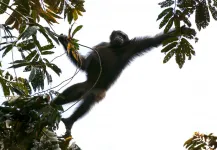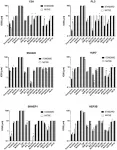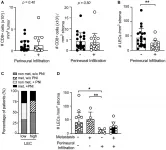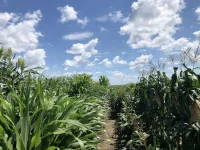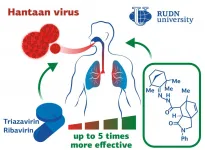INFORMATION:
The study involved over 60 co-authors from academic and non-academic organizations and government agencies, including Antwerp Zoo Society, Born Free Foundation, Chimbo Foundation, Conservation Society of Sierra Leone, Environment and Rural Development Foundation, Fauna & Flora International, Frankfurt Zoological Society, Jane Goodall Institute, Rio Tinto, Royal Society for the Protection of Birds, San Diego Zoo Wildlife Alliance, Sekakoh Organisation, Sierra Rutile Limited, Tacugama Chimpanzee Sanctuary, The Biodiversity Consultancy, West African Primate Conservation Action, Wild Chimpanzee Foundation, Wildlife Conservation Society (WCS), and World Wide Fund for Nature.
African great apes to suffer massive range loss in next 30 years
2021-06-07
(Press-News.org) A new study published in the journal Diversity and Distributions predicts massive range declines of Africa's great apes - gorillas, chimpanzees and bonobos - due to the impacts of climate change, land-use changes and human population growth.
For their analysis, the authors compiled information on African ape occurrence held in the IUCN SSC A.P.E.S. database, a repository that includes a remarkable amount of information on population status, threats and conservation for several hundred sites, collected over 20 years.
The first-of-its-kind study quantifies the joint effects of climate, land-use, and human population changes across African ape ranges for the year 2050 under best- and worst-case scenarios. "Best case" implies slowly declining carbon emissions and that appropriate mitigation measures will be put in place. "Worst case" assumes that emissions continue to increase unchecked - business as usual.
Under the best-case scenario, the authors predict that great apes will lose 85 percent of their range, of which 50 percent will be outside national parks and other areas protected by legislation. Under the worst-case scenario, they predict a 94 percent loss, of which 61 percent will be in areas that are not protected.
This paper examines whether great apes can or cannot disperse away from where they are currently found, and the best- and worst-case scenarios in each case. For example, mountains are currently less suitable than lowland areas for some great ape species. However, climate change will render some lowlands less suitable - warmer, drier, perhaps less food available - but the nearby mountains will take on the characteristics that those lowlands currently have. If great apes are able to physically move from the lowlands to the mountains, they may be able to survive, and even increase their range (depending on the species, and whether it is the best- or worst-case scenario). However, they may not be able to travel (disperse) away from the lowlands in the time remaining between today and 2050.
Joana Carvalho, postdoctoral researcher in the Faculty of Science, Liverpool John Moores University, lead author of the study says: "By integrating future climate and land-use changes as well as human population scenarios, this study provides strong evidence for synergistic interactions among key global drivers constraining African ape distribution."
Carvalho adds: "Importantly, massive range loss is widely expected outside protected areas, which reflects the insufficiency of the current network of protected areas in Africa to preserve suitable habitats for great apes and effectively connect great ape populations."
Fiona Maisels of the Wildlife Conservation Society (WCS), and a co-author of the study, said: "As climate change forces the different types of vegetation to essentially shift uphill, it means that all animals - not only great apes - that depend on particular habitat types will be forced to move uphill along with the vegetation, or become locally extinct. And when the hills are low, many species, great and small, will not be able go higher than the land allows, and huge numbers of animals and plants will simply vanish."
The authors argue that effective conservation strategies require careful planning for each species that focuses on both existing and proposed protected areas - the creation and management of which can be informed by these habitat suitability models. Additionally, efforts to maintain connectivity between the habitats predicted to be suitable in the future will be crucial for the survival of African apes. Conservation planners urgently need to integrate land-use planning and climate change mitigation and adaptation measures into government policy of great ape range countries.
The study highlights the need for urgent action to combat both biodiversity loss and climate change if great apes are to continue into the future. Governments must protect and conserve the habitats of great apes--where they are now, and where they will need to move. Governments attending the upcoming Convention on Biological Diversity CoP 15 in September and the UN Climate Change Conference in November should adopt meaningful commitments to protect and conserve great apes and their habitats and combat climate change.
The results of the study corroborate other recent studies showing that African ape populations and their habitats are declining dramatically. All African great apes are classified either as Endangered (mountain gorillas, bonobos, Nigeria-Cameroon chimpanzees, eastern chimpanzees, and central chimpanzees) or Critically Endangered (Cross River gorillas, Grauer's gorillas, western lowland gorillas, and western chimpanzees) on the IUCN Red List of Threatened Species, and all are regarded as flagship species for conservation.
Hjalmar Kuehl, from iDiv in Leipzig, Germany, and senior author of the study said: "There must be global responsibility for stopping the decline of great apes. Global consumption of natural resources extracted from ape range countries is a major driver of great ape decline. All nations benefitting from these resources have a responsibility to ensure a better future for great apes, their habitats and the people living therein by developing more sustainable economies."
ELSE PRESS RELEASES FROM THIS DATE:
Oncotarget: The drug sensitivity of hepatocellular cancer cells
2021-06-07
Oncotarget published "Effect of cell microenvironment on the drug sensitivity of hepatocellular cancer cells" which reported that this study aimed to investigate whether Hepatocellular Cancer (HCC) cells cultured in more native conditions have an altered phenotype and drug sensitivity compared to those cultured in standard conditions.
Six HCC cell lines were cultured in "standard" or more "native" conditions.
HCC cells cultured in native conditions had slower doubling times, increased HK2 and GLUT, lower PHDA and ATP levels, and mutations in mitochondrial DNA.
From 90 comparisons of drug sensitivity, increased resistance ...
Oncotarget: Infiltration in human skin squamous-cell carcinoma
2021-06-07
Oncotarget published "Mutually exclusive lymphangiogenesis or perineural infiltration in human skin squamous-cell carcinoma" which reported that although tumor-associated lymphangiogenesis correlates with metastasis and poor prognosis in several cancers, it also supports T cell infiltration into the tumor and predicts favorable outcome to immunotherapy.
Using quantitative multiplex immunohistochemistry, the authors analyzed skin squamous-cell carcinoma (sSCC) sections from 36 patients.
CD8 T cell infiltration showed great differences between patients, whereby these ...
Army researchers develop innovative framework for training AI
2021-06-07
ADELPHI, Md. -- Army researchers developed a pioneering framework that provides a baseline for the development of collaborative multi-agent systems.
The framework is detailed in the survey paper Survey of recent multi-agent reinforcement learning algorithms utilizing centralized training, which is featured in the SPIE Digital Library. Researchers said the work will support research in reinforcement learning approaches for developing collaborative multi-agent systems such as teams of robots that could work side-by-side with future Soldiers.
"We propose that the underlying information sharing mechanism plays a critical role in centralized learning for multi-agent systems, ...
Infrared imaging leaves invasive pythons nowhere to hide
2021-06-07
WASHINGTON -- For more than 25 years, Burmese pythons have been living and breeding in the Florida Everglades where they prey on native wildlife and disrupt the region's delicate ecosystems. A new study shows that infrared cameras could make it easier to spot these invasive snakes in the Florida foliage, providing a new tool in the effort to remove them.
In the Optical Society (OSA) journal Applied Optics, researchers led by Dr. Kyle Renshaw from the University of Central Florida College of Optics and Photonics report that a near infrared camera helped people detect Burmese pythons at distances up to 1.3 times farther away than was possible using a traditional visible-wavelength ...
Sensing what plants sense: Integrated framework helps scientists explain biology and predict crop performance
2021-06-07
AMES, Iowa - Scientists have invested great time and effort into making connections between a plant's genotype, or its genetic makeup, and its phenotype, or the plant's observable traits. Understanding a plant's genome helps plant biologists predict how that plant will perform in the real world, which can be useful for breeding crop varieties that will produce high yields or resist stress.
But environmental conditions play a role as well. Plants with the same genotype will perform differently when grown in different environments. A new study led by an Iowa State University scientist uses advanced data analytics to help scientists understand ...
Study helps to deeper understanding of brain dysfunctions in patients with schizophrenia
2021-06-07
A study conducted by a group of Brazilian researchers contributes to a deeper understanding of the molecular basis for schizophrenia, and potentially to the development of more specific and effective treatments for the disease. The medications currently available on the market act generically on the brain and can have severe adverse side effects.
Treatment of post-mortem samples from the hippocampus of schizophrenic patients with an NMDA receptor antagonist pointed to biological processes associated with the disease that are specific to neurons and oligodendrocytes. NMDA receptors are neurotransmitter receptors located in the postsynaptic ...
New potential therapy for fatty liver disease
2021-06-07
In those with fatty liver disease, a person's fat goes to their liver instead of their fat tissue, either because of an absence of fat depots, which is seen in the rare genetic disease lipodystrophy, or because the depots are too full, which is seen in people with obesity.
One third of these people will go on to develop nonalcoholic steatohepatitis, or NASH - an advanced form of fatty liver disease brought on by progressive inflammation and scarring in the organ.
In 2002, Michigan Medicine endocrinologist Elif Oral, M.D., who had just moved from the National Institutes of Health at the time, published her discovery that patients with severe lipodystrophy lack leptin, a hormone that helps curb appetite and control weight gain. When given ...
Feedback on cafeteria purchases helps employees make healthier food choices
2021-06-07
BOSTON - Automated emails and letters that provide personalized feedback related to cafeteria purchases at work may help employees make healthier food choices. That's the conclusion of a new study that was led by investigators at Massachusetts General Hospital (MGH) and is published in END ...
RUDN University chemists created anti-hantavirus drugs 5 times more efficient than existing drugs
2021-06-07
RUDN University chemists and their colleagues from Novosibirsk State University, Novosibirsk Institute of Organic Chemistry and The State Research Center of Virology and Biotechnology VECTOR have obtained a new class of compounds that inhibit the replication of the deadly Hantaan virus that affects blood vessels and internal organs of humans. The resulting substances were 5 times more effective than existing antiviral drugs. The results have been published Bioorganic & Medicinal Chemistry Letters.
The Hantaan virus causes acute haemorrhagic fever with renal syndrome (HFRS). The disease ...
Space travel weakens our immune systems: Now scientists may know why
2021-06-07
Microgravity in space perturbs human physiology and is detrimental for astronaut health, a fact first realized during early Apollo missions when astronauts experienced inner ear disturbances, heart arrhythmia, low blood pressure, dehydration, and loss of calcium from their bones after their missions.
One of the most striking observations from Apollo missions was that just over half of astronauts became sick with colds or other infections within a week of returning to Earth. Some astronauts have even experienced re-activation of dormant viruses, such as the chickenpox virus. These findings stimulated studies on the effects of weak gravity, or ...
